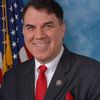Paul Ron Cruz
Paul Ron Cruz (Democratic Party) is running in a special election to the U.S. Senate to represent Florida. He declared candidacy for the special Democratic primary scheduled on August 18, 2026.[source]
Cruz completed Ballotpedia's Candidate Connection survey in 2025. Click here to read the survey answers.
Biography
Paul Ron Cruz was born in New York, New York. Cruz's career experience includes working as a defense contractor, licensed life insurance agent, small business owner, project manager, and assistant manager. He served in the U.S. Army from 2004 to 2021. Cruz earned a high school diploma from Miami Southridge Senior High School.[1]
Elections
2026
See also: United States Senate special election in Florida, 2026
General election
The primary will occur on August 18, 2026. The general election will occur on November 3, 2026. Additional general election candidates will be added here following the primary.
Special general election for U.S. Senate Florida
Neelam Perry is running in the special general election for U.S. Senate Florida on November 3, 2026.
Candidate | ||
 | Neelam Perry (No Party Affiliation) | |
 = candidate completed the Ballotpedia Candidate Connection survey. = candidate completed the Ballotpedia Candidate Connection survey. | ||||
| If you are a candidate and would like to tell readers and voters more about why they should vote for you, complete the Ballotpedia Candidate Connection Survey. | ||||
Do you want a spreadsheet of this type of data? Contact our sales team. | ||||
Democratic primary election
Special Democratic primary for U.S. Senate Florida
The following candidates are running in the special Democratic primary for U.S. Senate Florida on August 18, 2026.
Candidate | ||
| Joey Mendoza Atkins | ||
 | Paul Ron Cruz  | |
| Frank DiMola | ||
| Charles Gould | ||
 | Alan Grayson | |
 | Tamika Lyles | |
| Evelyn McBride | ||
 | Hector Mujica | |
 | Angela Nixon | |
| Dennis Stevens | ||
| Alex Vindman | ||
 = candidate completed the Ballotpedia Candidate Connection survey. = candidate completed the Ballotpedia Candidate Connection survey. | ||||
| If you are a candidate and would like to tell readers and voters more about why they should vote for you, complete the Ballotpedia Candidate Connection Survey. | ||||
Do you want a spreadsheet of this type of data? Contact our sales team. | ||||
Withdrawn or disqualified candidates
- Jennifer Jenkins (D)
- Joshua Weil (D)
Republican primary election
Special Republican primary for U.S. Senate Florida
The following candidates are running in the special Republican primary for U.S. Senate Florida on August 18, 2026.
 = candidate completed the Ballotpedia Candidate Connection survey. = candidate completed the Ballotpedia Candidate Connection survey. | ||||
| If you are a candidate and would like to tell readers and voters more about why they should vote for you, complete the Ballotpedia Candidate Connection Survey. | ||||
Do you want a spreadsheet of this type of data? Contact our sales team. | ||||
Endorsements
Ballotpedia is gathering information about candidate endorsements. To send us an endorsement, click here.
Campaign themes
2026
Ballotpedia survey responses
See also: Ballotpedia's Candidate Connection
Paul Ron Cruz completed Ballotpedia's Candidate Connection survey in 2025. The survey questions appear in bold and are followed by Cruz's responses.
| Collapse all
- ECONOMY: Florida deserves a strong, thriving economy that empowers businesses, creates jobs, and supports the middle class. we need an economy that rewards hard work and ensures that every Floridian has the opportunity to succeed.
- IMMIGRATION: an immigration system that is fair, secure, and compassionate. ensure the safety and security of our borders while creating pathways for legal immigration that reflect the values of opportunity and freedom
- ANTI-WAR: As a combat veteran, i understand the devastating consequences of war. we need leaders who prioritize peace and diplomacy, not endless wars.
Working-Class Understanding – Worked in construction, food service, call centers, and education—knows the value of a hard day's work.
Military Insight – Conducted mission support and policy execution in overseas combat and support zones.
Community Advocacy – Led initiatives focused on education, youth mentorship, and neighborhood upliftment.
Resilience – Overcame depression, anxiety, and combat trauma through therapy, family support, and service.
Policy-Making Readiness – Experience with interagency collaboration, implementation, and strategic planning.
Bipartisanship Potential – Proven history of bridging ideologies while remaining grounded in moral values.
Commitment to Equity – Advocates for better representation of Latinos, veterans, and marginalized communities.
Ethical Leadership – Career defined by service to country over self-interest.
Approve presidential appointments: If the president wants to hire someone for a big job (like a judge or a cabinet member), the Senate needs to approve or deny the person.
Senators are involved in important, long-term issues, and it is absolutely essential to work with other Senators from other states to get things done.
Strengthen Congressional Oversight & Rule of Law
Combat Executive Overreach
Investigations should serve as a vital check on actions like impoundment—presidential refusals to spend approved funds—that undermine democratic accountability.
Monitor Emerging Policy Shifts
As proposals like Project 2025 seek to expand federal control, Senate inquiries must pre-emptively assess implications for civil liberties and states' rights.
Ensure Government Accountability
Expose Corruption and Mismanagement
Drawing from tools like subpoenas and referrals to the Justice Department, the Senate must investigate abuses in executive agencies and promote transparency.
Support Bipartisan Fact-Finding
Oversight should prioritize clear, open-ended questioning and guard against partisan misuse, echoing best practices noted by watchdogs.
Modernize Investigative Structures
Empower Committees for Depositions
Senate rules currently require specific resolutions for deposition authority—modern reforms should codify standing depositions for urgent oversight.
Establishment of independent investigation units or commissions inside Congress could help depoliticize inquiries and maintain objectivity.
Oversight of National Security and Cyber Domains
Strengthen Intelligence Accountability
The Select Committee on Intelligence is critical in overseeing agencies and intelligence activities—especially as AI and cybersecurity threats evolve.
Hold Cyber Agencies to Account
With ongoing debates over the role of CISA in managing disinformation, Senate oversight should protect national security while safeguarding civil liberties.
Qualifications and Competence - Relevant expertise: Does the nominee have the professional background and skills needed to lead the department effectively?
Management ability. Past performance. Ethics and Integrity.
Financial disclosures: Are there conflicts of interest, questionable business ties, or ethical red flags?
Commitment to the law: Do they respect constitutional limits and the rule of law?
Public trust: Will their conduct inspire confidence that the agency is being run for the public good, not personal or political gain?
Policy Alignment - Presidential priorities: While presidents deserve some deference, Senators weigh whether the nominee’s views align with the broad interests of the nation.
Bipartisan respect: Is the nominee someone who can be trusted across party lines, or are their views too extreme to faithfully administer the law?
Key issue stance: For example, a Secretary of Defense must demonstrate clear judgment on war powers; a Secretary of Treasury must show sound fiscal reasoning.
Respect for Oversight and Transparency
Commitment to Congress: Will the nominee respect Congress’s oversight role, testify honestly, and provide information when asked?
Accountability: Are they willing to be held responsible for the department’s successes and failures?
Transparency track record: Have they engaged openly with the public, media, or watchdog organizations?
Temperament and Leadership
Decision-making under pressure: Especially critical for national security, economic, or crisis management roles.
Ability to lead diverse teams: Federal departments are large, diverse, and require inclusive leadership.
Protect against discriminatory voting policies.
Ballot Access & Fairness
Ranked-Choice Voting - Expanding voter access; limits gerrymandering.
Transparency & Security
Ensures verifiable and secure elections.
Voter Engagement
Automatic Registration, Pre-Registration -Boost participation among youth and underserved groups.
Primary Reform
Promote innovation and bipartisan primaries.
Election Integrity
Note: Ballotpedia reserves the right to edit Candidate Connection survey responses. Any edits made by Ballotpedia will be clearly marked with [brackets] for the public. If the candidate disagrees with an edit, he or she may request the full removal of the survey response from Ballotpedia.org. Ballotpedia does not edit or correct typographical errors unless the candidate's campaign requests it.
Campaign finance summary

See also
2026 Elections
External links
Footnotes
- ↑ Information submitted to Ballotpedia through the Candidate Connection survey on September 1, 2025













